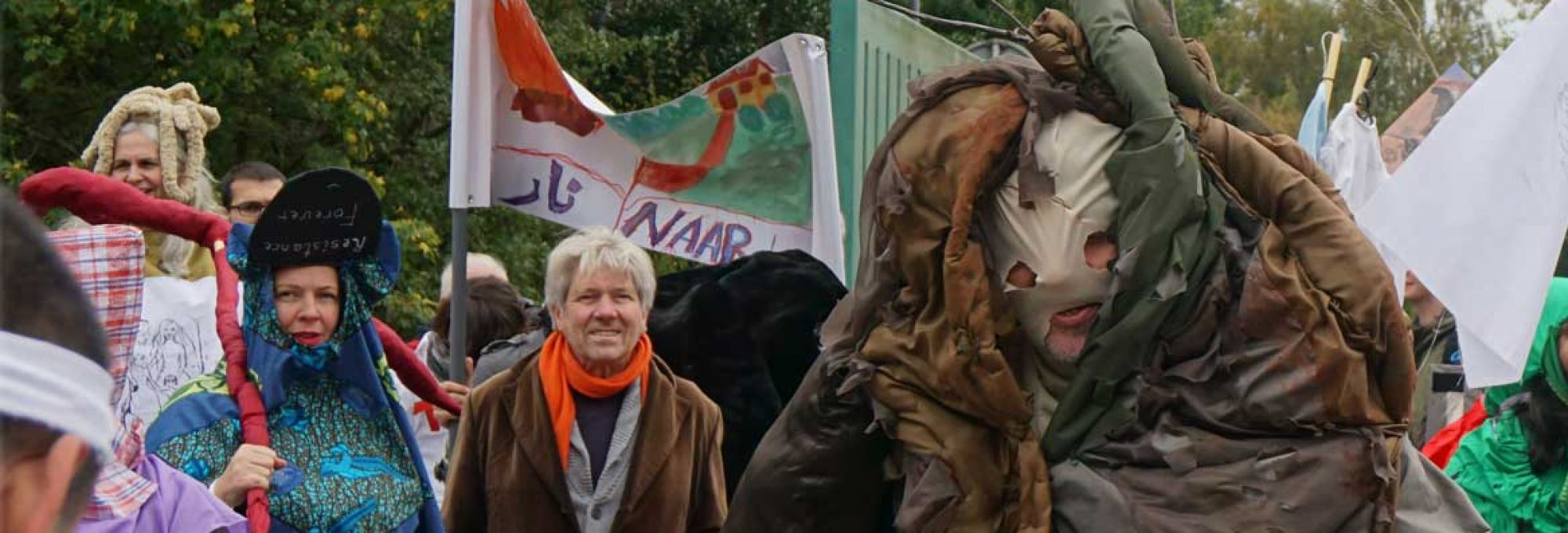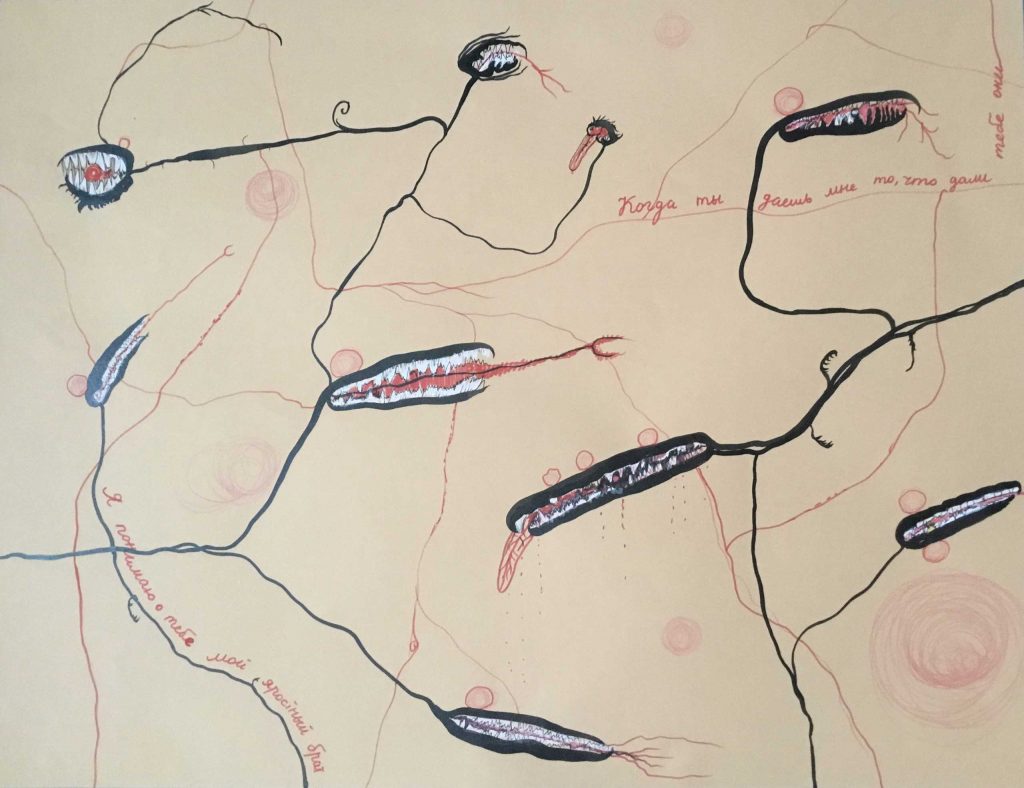Issue No 6
dec-jan 2021
Vijf interviews – Depot
Een ongebreidelde fascinatie voor planten – De botanische revolutie in het Centraal Museum Utrecht en Nest Den Haag

Natalia Pershina-Yakimanskaya
Issue No 6
dec-jan 2021
Vijf interviews – Depot
Een ongebreidelde fascinatie voor planten – De botanische revolutie in het Centraal Museum Utrecht en Nest Den Haag
Red Dress Congress as part of Space 1520, an artistic research laboratory at GARAGE Museum of Contemporary Art /Moscow /2021-22
“Dream/Bed”, series for Mn Artists program of the Walker Art Centre, Minneapolis MN USA, https://mnartists.walkerart.org/
Gluklya: https://mnartists.walkerart.org/letters-to-the-doctor
Date:
4 Dec 2021–13 Mar 2022
Place:
GES-2
https://v-a-c.org/en/ges2/when-gondola-engines-were-taken-to-bits-exhibition
ACC Gallery Weimar, Germany,
2021/2022
A brief introduction
Defamation as an instrument of social control with unaccountable consequences seems to have been always present. As a communication strategy, it often serves to exclude individuals, makes society and individuals ill, bears the traits of a passion. Yet it appears to be an anthropological given, closely linked with curiosity, rumor, gossip, and betrayal. So we, too, are at risk, because a particular criminal energy is not required for defamation – in times of digital networks, it is even tempting and easier for everyone, and the transition from inconspicuous ordinary citizen to the defamator is fluid. We are apparently seduced into defamation by a heightened need for aroused sense of control and aroused desire for power, in short a potential, a block-warden-mentality that is potentially dormant in us. Non-political backgrounds are often the cause of ‘common’ defamation, rather hidden private motives such as envy, resentment, bitterness, feelings of revenge and jealousy play an important role. If one can exert little influence in any other way, he or she might try to get rid of a competitor or to exercise power over a superior by making a false (anonymous) statement. The feeling of being of influence seems to some so appealing that moral considerations are superseded. At the same time, different social environments produce different patterns of defamatory behavior, ranging from personal favoritism to state domination and combinations of both. It is possible that the tendency to defamation is particularly high in times of diffuse political insecurity. Its effectiveness also depends on the prevailing norms and social conditions. An ethic of dealing with our information behavior and its consequences is unavoidable, because, just as there are reports that are ethically required or reports to the state or institutions are necessary, other reports can be devastating for the individual. As is known, the victims of defamation as a ‘weapon’ often suffer from vehemently damaged trust; they have not infrequently paid with their lives.
In an upcoming international group exhibition, eight to ten artists will show works that explore defamatory behavior and examine various aspects of defamation, works that deal with specific cases of defamation, its history, the psychology of the defamator and the victim, defamation techniques and language use, the role of (mass-)media and social networks, the role of anonymity, and so on.
Altyn-Kazyk, Bishkek
group show NEST / Den Haag ,10 September 2021
Propaganda Flowers is a series of drawings that are accompanied by stories from interviews with people from different countries on the connection between politics and flowers. For example, the Kimilsungia violet orchid was named after Kim Il-Sung, former leader of North Korea, and tells a narrative about the remembrances of socialism. The Vampire Tulip asks questions about human hypocrisy, distracted from the water crisis in Africa, whereas the Welwitschia flower is accompanied by the text about the flower as a symbol for democracy. Each drawing touches upon the ethics of politics, combining the sweet symbolism of flowers with deep geopolitical concerns.
For the exhibition at Nest in The Hague, Can you be a revolutionary and still like flowers?, a new chapter of the Propaganda Flowers series was created. The works was done in the context of Russia , with supportive conversations with the eco -activist Maria Tinika who created a Saving Trees society in St -Petersburg.
photo documentation of the Installation : Charlott Markus
Reviews:
Den Haag Centraal: https://www.nestruimte.nl/bloemen-als-symbolen-van-verzet/
Groene Amsterdammer: https://www.groene.nl/artikel/de-laatste-sanseveria and https://www.groene.nl/artikel/dansende-bloemen

About the Language of Fragility, the concept of Gluklya is described by Sari Akminas (a syrian refugee, a journalist, who works at Lola Lik):
Learning the Dutch language is a serious challenge for newcomers to the Netherlands. There are many methods and ways to learn a new language, other than traditional learning, which can give added value to the language learning process. One alternative method is by playing the Language of Fragility game. No matter what language is spoken, the number of words that have similar pronunciation in a native language and Dutch is surprising. Words sound the same, but have completely different meanings.
This game can be an important tool for newcomers. It allows them to acquire new knowledge, motivates them to search and find similar words between different languages, opens a window for them to see the country’s culture, and finds opportunities to learn new skills.
The combination of language + arts, gives newcomers a way to express feelings in a new country without restriction, and to produce something of beneficial artistic and cultural value. By engaging in a workshop of making Utopian Clothes, the Language of Fragility teaches performative skills that enable participants to express emotional feelings; be it frustration, fear by targeting these emotions and in turn, finding balance and self-confidence.
Language of Fragility is not limited to the individual level. Participants learn words that have similar pronunciation, but disparate meanings in different languages. The game encourages players to create an atmosphere of partnership and unity among themselves, motivating them to participate in teamwork and to unleash imagination in creativity and self-discovery.
Naar(fire)
Dutch people use the word (Naar) to refer to a place they are going to, but in Arabic, the word (Naar) means fire.
The woman is going Naar the fire, to the house, where woman leave it to their husband house, because of the suppression and dianilation that the women are facing in the Arab world. A lot of women don’t know the life outside the house, only on TV.
From her father’s house to her husband’s house to the grave. This is the circle of a large number of the women in the Arab world, they are not allowed to know or to think outside this triangle, and for those who does, they shall be called in the ugliest titles, and yet to be considered as an outsider of the society.
____________
Boot\ Boot (military shoe)
Boot is the bone that the dog catches, and they keep it in their mouses, they like the taste of it.
(Boot) in Arabic means shose, and it is commonly refer to the military shoes, which are in Syria are being bitted at like the dogs bits the bone by the pro Assad people in Syria.
People using non intellectual ways to express their loyalty to the rulers, in Syria, the pro Assad took the military shoes as a symbol. They made statues in the public squares for it, live show on tv with the shoes on the table, pro Assad people, famous artists, sculpture, actors, they were all shown with this slogan (one of them was kissing it) on TV and in public events.
It is another way to worship the leader; since the war in Syria, a lot of talk took place about the ownership of Syria to Assad, as the country is his farm. Now by changing from worshiping the leader, into worshiping the military (where the ruler is the higher commander of the army) nothing will change, and the people, voluntarily subject themselves to the slavery of the ruler again.
——————————
Nmer (tiger)
Nmer in Arabic is tiger, but in Dutch, Nummer is a number.
Numbers are exactly how the government see the people when they are looking for support.
The soldiers who die to keep the ruler in chair are only numbers to the leadership.
When they tell people how good the economy is, where actually it is very bad, fake numbers are being used.
So stop being a “dutch Nummer”, and became an “Arabic NAcht \ اخت
Acht (sister)
Two words similar in pronunciations, Acht in Arabic means sister, while in Dutch means eight, which is the average number of the sisters and brothers in the Arab region families.
“The kid come, and God send his money with it” This is the slogan adopted by the peoples of the Arab region, and they do not give up this slogan even in the most severe crises. You see a family of a government employee who doesn’t earn enough salary, or a worker who earns the minimum wage. They have six children and their poor wives are Pregnant! “Her belly reaches her chin” this is how Arab people describe pregnant women.
Ask the men why? And from where will you secure the budget? they responds with a smile to “The kid come, and God send his money with it” and wishe God to send more bless…
Sister behind brother, behind sister… Arab women are being used as a breathing machine, year after year, born after the other, especially in the poor tribal and rural areas, and then leaves the children in the streets, to learn begging, so we ended up with a whole generation in the streets.
The government is unable to control the issue, or issue a birth control law, a poor economic situation and men who do not use condoms, women can not object. Eggs hatch to the streets… Acht after Acht after Acht…
Boot\ Boot (military shoe)
Boot is the bone that the dog catches, and they keep it in their mouses, they like the taste of it.
(Boot) in Arabic means shose, and it is commonly refer to the military shoes, which are in Syria are being bitted at like the dogs bits the bone by the pro Assad people in Syria.
People using non intellectual ways to express their loyalty to the rulers, in Syria, the pro Assad took the military shoes as a symbol. They made statues in the public squares for it, live show on tv with the shoes on the table, pro Assad people, famous artists, sculpture, actors, they were all shown with this slogan (one of them was kissing it) on TV and in public events.
It is another way to worship the leader; since the war in Syria, a lot of talks took place about the ownership of Syria to Assad, as the country is his farm. Now by changing from worshiping the leader, into worshiping the military (where the ruler is the higher commander of the army), nothing will change. The people voluntarily subject themselves to the slavery of the ruler again.
March 2022
McKinney visiting artist to the Eskenazi School of Art, Architecture, and Design
Indiana University – Bloomington
zoom artist talk and graduate studio visits